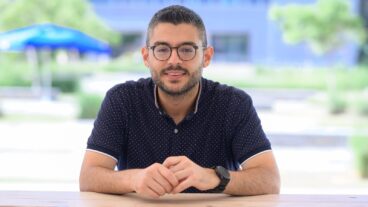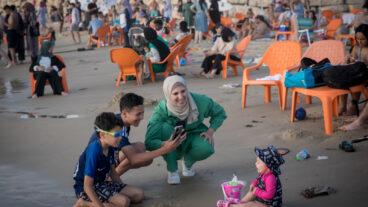Kiram Baloum: Women are capable of doing everything, they just have to be enabled to do so.If anyone can understand the plight of Israeli Arab women today, then it’s Kiram Baloum, director of the Women’s Empowerment Unit of the Center for Jewish-Arab Economic Development (CJAED). Born one of nine children in the village of Taibe, she has never forgotten the struggle many Israeli Arab women face when they try to find work.
“I always put myself in their place,” admits the 38-year-old. “I always think about what conditions they are experiencing, and where they come from.”
In Israel, Arab women are at the bottom of the food chain when it comes to employment. Only 14 percent are employed, compared to 57 percent in the Jewish sector. Many women want to work, but lack of appropriate training, poor public transportation, and the demands of a family, make finding work extremely problematic.
Baloum, an energetic woman with shoulder length dark hair and a striking face, is trying to reverse this trend. Since she joined the center when it was founded in 1997, she has devoted herself to creating new employment opportunities for this disadvantaged sector, working round the clock to help over 3,000 Arab women set up businesses across Israel.
In January she was honored for her work when the Ha’aretz-The Marker’s magazine TMWomen featured her as one of the top 40 women “making a change in Israeli society.” Just a few days earlier, Baloum appeared on the Israeli Internet news site, Ynet, as the manager of Jasmine, a new association of businesswomen in Israel, which was launched by CJAED in September. Ynet included Jasmine among the top 12 social projects of 2006.
“I exaggerate the amount of time I give to my work,” admits Baloum, whose mobile phone rings repeatedly through an interview. “It’s not just a job. I feel driven.”
Taibe is an Israeli Arab town sandwiched between the Israeli city of Kfar Saba and the West Bank. Like so many such towns and cities, it is poor, run-down and with high unemployment. Baloum’s mother never worked, and her father was a constructor. Neither of them had much education, but despite this they insisted that all of their children – girls and boys – should study at university.
“We had a lot of encouragement from both my mother and father,” Baloum told ISRAEL21c. “There was a lot of emphasis given to the education of the girls. My father believed that you can never know what will happen to your daughter, so it’s better to go to university.”
Baloum studied for a BA in education and history, and then took a job managing the corresponding lab to the Israeli Standards Institute, which operated in the Arab sector and the Palestinian Authority.
When Baloum heard that the CJAED was looking for a director for its new women’s unit, which is dedicated to employment solutions for Arab women in Israel, she volunteered herself for the position, and was accepted immediately.
“I was looking for a challenge, and I wanted to help women set off on an independent path, both socially and economically,” she said in the January interview with Ha’aretz.
In the years since then, Baloum has helped found a number of significant projects through the women’s empowerment unit. Today it offers various training courses and workshops, on funding, sales and credit. It has a loan fund that offers grants to women who find it hard to receive credit; eight regional forums for Arab and Jewish businesswomen across the country, which meet regularly and offer support and advice; and Jasmine, which acts as an umbrella organization for all the women’s networks across Israel. Other successes include the pickle factory in Tamra, and the Asala Desert Nature project in Tel Sheva.
Baloum says the unit emphasizes a multi-faceted approach. Involvement begins with initial training courses offered to women interested in setting up in business, and continues with the provision of mentoring for new businesses, including pro-bono legal and accounting consultation.
“Until not long ago, even if there were Arab women registered as business owners, they were not active in the business. The goal is to turn them into an integral and important part of the household’s economy, and to enable them to realize their personal potential,” Baloum told Ha’aretz. “Women are capable of doing everything, they just have to be enabled to do so.”
While in recent years, there has been growing pressure for Israeli Arab women to join the workforce, Baloum admits that it is still not easy. “Women always have to be careful to keep the support of their husbands throughout the process, women who can keep this and involve their husbands are the ones that can achieve the most success. The couple succeeds together,” she said.
She cites the Asala Desert Nature project as an example. Set up by Bedouin women from Tel Sheva, the project aims to use desert plants for a line of skin care products, and has been running for two years already without profit.
“Despite this the men are still supporting their wives,” says Baloum. “The women don’t want to go down the path of their mothers who never worked, and their husbands support them. It’s a whole new generation of men and women.”
While attitudes towards working women and mothers have begun to change, Baloum admits that attitudes towards career women are taking longer to see a transformation.
“Going out to work, that’s not really difficult, having a career is,” she explains. “It can make it difficult in family life, the partner might think of it differently. Any woman with a career devotes two thirds of her time to that. This comes at the expense of her family and her personal life. The more successful she is, the more she devotes to her career, and this creates problems.”
Baloum, who is not married, understands from personal experience that men can be put off by career women. “Men can be frightened of it, it can be threatening to them,” she says.
Baloum has many plans for the future at CJAED. “The unit’s goal is to always, always, always keep on working to promote entrepreneurship,” she says. “That will never change.”
She is working constantly to promote continuity at the unit, encouraging women who have already undertaken courses and built successful businesses to share their knowledge with women who are just starting out.
In Taibe, where she still lives, Baloum recently founded Injaz (achievements) to promote education and economic development for women in the town. “I love Taibe and I have lots of ideas of projects to give back to the community,” she says.
When Baloum looks back at her work over the last nine years, she feels her greatest achievement lies in the changes that have taken place in attitudes towards Israeli Arab women starting and running their own businesses.
“That’s a result of the work we’ve undertaken in the last years, not just us, but other organizations as well. There’s been a sea change in attitudes,” she says proudly.
It makes all her hard work worthwhile.













